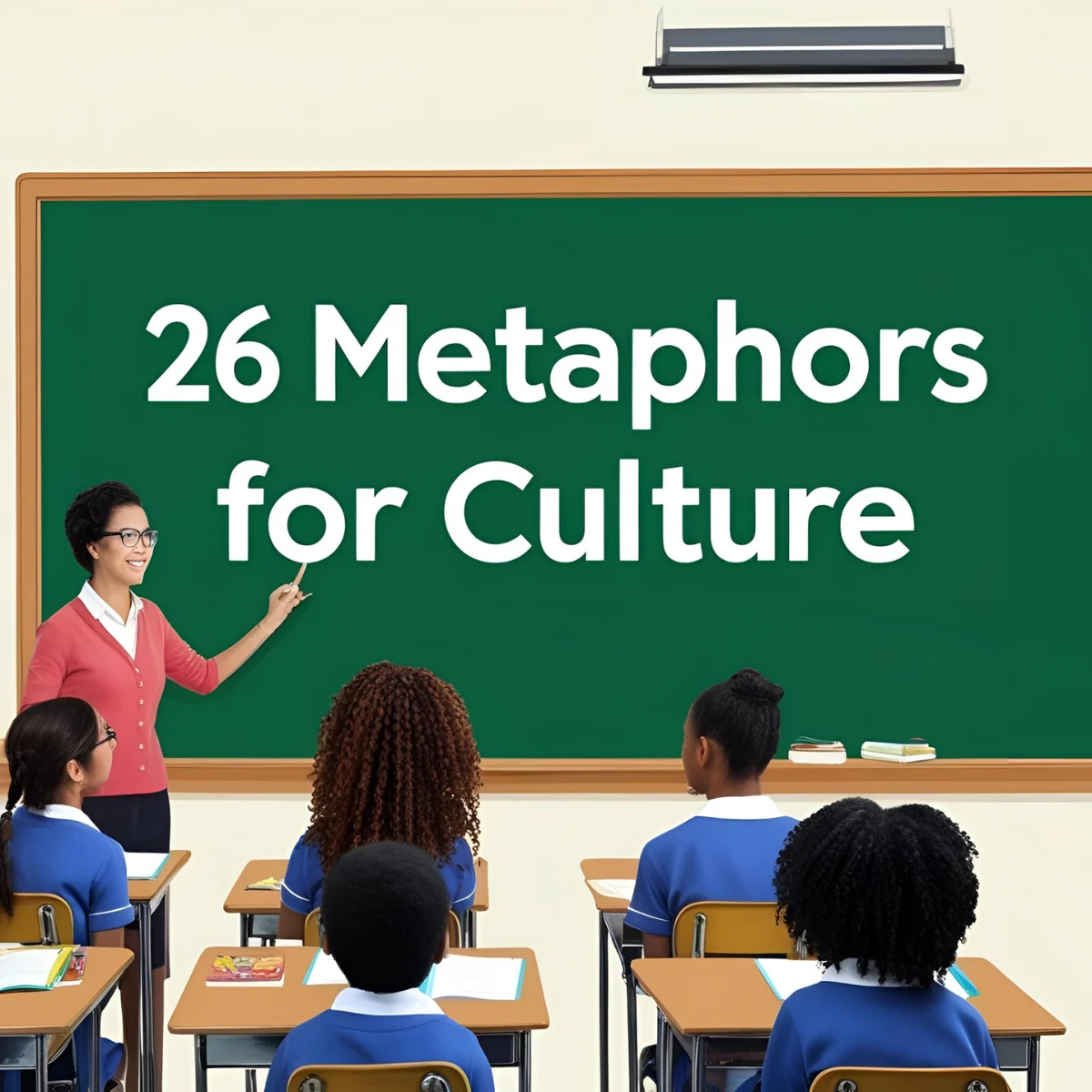Culture is the living, breathing expression of who we are—our beliefs, customs, languages, and stories. It shapes our identity and binds communities together, yet it’s often best understood through metaphor. From “a melting pot” to “a garden of traditions,” metaphors bring culture to life with imagery that reflects diversity, evolution, and shared meaning.
Whether you’re writing about global communities or local heritage, these metaphors help communicate culture’s richness. In this article, we’ll explore 26 powerful metaphors that illuminate the essence of culture.
1. A Tapestry of Traditions
Meaning: Culture is woven from many different influences and experiences.
Example: “Each generation adds a new thread to the tapestry of traditions.”
Tone: Rich, intricate.
Other ways to say it: A fabric of history, a woven masterpiece.
2. The Roots of a Mighty Tree
Meaning: Culture is the foundation that nourishes and sustains society.
Example: “The roots of a mighty tree run deep, just like our cultural heritage.”
Tone: Grounded, strong.
Other ways to say it: The foundation of identity, the trunk of civilization.
3. A River of Influence
Meaning: Culture flows through time, shaping and being shaped by history.
Example: “Like a river of influence, culture carves new paths through generations.”
Tone: Dynamic, evolving.
Other ways to say it: A stream of heritage, a current of identity.
4. A Garden of Diversity
Meaning: Culture thrives on variety and grows through shared experiences.
Example: “A garden of diversity flourishes when different traditions bloom together.”
Tone: Vibrant, inclusive.
Other ways to say it: A mosaic of ideas, a bouquet of traditions.
5. The DNA of a Society
Meaning: Culture is an essential and defining part of a community’s identity.
Example: “Language, art, and traditions are the DNA of a society.”
Tone: Essential, fundamental.
Other ways to say it: The blueprint of a people, the genetic code of civilization.
6. A Living Organism
Meaning: Culture changes, adapts, and grows like a living being.
Example: “Like a living organism, culture evolves to survive in changing times.”
Tone: Adaptive, ever-changing.
Other ways to say it: A breathing tradition, an evolving ecosystem.
7. A Mirror of Society
Meaning: Culture reflects the values, beliefs, and norms of a people.
Example: “Art, music, and literature act as a mirror of society.”
Tone: Observational, insightful.
Other ways to say it: A reflection of values, a looking glass into history.
8. A Bridge Between Generations
Meaning: Culture connects the past, present, and future.
Example: “Stories and rituals serve as a bridge between generations.”
Tone: Unifying, timeless.
Other ways to say it: A link through time, a connection across ages.
9. The Heartbeat of a Nation
Meaning: Culture keeps a nation’s spirit alive and thriving.
Example: “Festivals, language, and music form the heartbeat of a nation.”
Tone: Passionate, lively.
Other ways to say it: The soul of a people, the pulse of tradition.
10. The Soul’s Song
Meaning: Culture is an emotional and artistic expression of people’s identity.
Example: “The soul’s song echoes in the poetry, music, and dances of a culture.”
Tone: Poetic, expressive.
Other ways to say it: A melody of history, the rhythm of heritage.
11. A Fire That Never Dies
Meaning: Culture is passed down and continues to burn brightly through generations.
Example: “Oral traditions keep the fire that never dies alive.”
Tone: Enduring, warm.
Other ways to say it: An eternal flame, a torch of wisdom.
12. The Colors of a Rainbow
Meaning: Culture is vibrant, diverse, and full of different perspectives.
Example: “Every tradition adds a new hue to the colors of a rainbow.”
Tone: Bright, celebratory.
Other ways to say it: A spectrum of identity, a kaleidoscope of customs.
13. A Puzzle of Many Pieces
Meaning: Culture is made of different elements that fit together to form a whole.
Example: “Each language, belief, and custom is a piece in the puzzle of many pieces.”
Tone: Complex, interwoven.
Other ways to say it: A mosaic of heritage, a quilt of traditions.
14. A Tree with Many Branches
Meaning: Culture grows and expands, embracing different influences.
Example: “Our customs are the tree with many branches, each extending in its own direction.”
Tone: Expansive, nurturing.
Other ways to say it: A forest of traditions, a canopy of beliefs.
15. The Foundation of Identity
Meaning: Culture gives people a sense of belonging and self-understanding.
Example: “History and tradition form the foundation of identity.”
Tone: Solid, defining.
Other ways to say it: A pillar of belonging, the roots of the self.
16. A Flame Passed from Hand to Hand
Meaning: Culture is shared and passed on through generations.
Example: “Folklore is a flame passed from hand to hand, never fading.”
Tone: Eternal, symbolic.
Other ways to say it: A torch of knowledge, a lantern of wisdom.
17. A Cookbook of Traditions
Meaning: Culture is made up of various ingredients, each adding its own flavor.
Example: “Each dish tells a story in the cookbook of traditions.”
Tone: Flavorful, rich.
Other ways to say it: A recipe for heritage, a feast of customs.
18. A River That Never Stops Flowing
Meaning: Culture continuously evolves and moves forward.
Example: “Our traditions are like a river that never stops flowing.”
Tone: Timeless, ever-changing.
Other ways to say it: A stream of history, an endless current of tradition.
19. A Stage Where Stories Unfold
Meaning: Culture is where history, myths, and beliefs are performed and remembered.
Example: “Festivals turn our world into a stage where stories unfold.”
Tone: Dramatic, engaging.
Other ways to say it: A grand performance, a living narrative.
20. A Library of the Past
Meaning: Culture stores the wisdom, history, and stories of ancestors.
Example: “Our ancestors’ knowledge is preserved in the library of the past.”
Tone: Historic, wise.
Other ways to say it: An archive of tradition, a vault of wisdom.
21. A Web of Connections
Meaning: Culture connects people, traditions, and societies.
Example: “Music and art form a web of connections between cultures.”
Tone: Interwoven, inclusive.
Other ways to say it: A network of history, a lattice of heritage.
22. A Seed That Grows with Time
Meaning: Culture begins as an idea and flourishes over generations.
Example: “What was once a simple ritual is now a seed that grows with time.”
Tone: Nurturing, evolving.
Other ways to say it: A tree of tradition, a sprouting legacy.
23. The Fabric of Society
Meaning: Culture is woven into the social structure of a community.
Example: “Language and customs form the fabric of society.”
Tone: Strong, interconnected.
Other ways to say it: A quilt of beliefs, a woven heritage.
24. The Air We Breathe
Meaning: Culture is everywhere and influences everything we do.
Example: “Culture is the air we breathe, shaping our views without us noticing.”
Tone: Omnipresent, subtle.
Other ways to say it: The invisible force of society, the unseen rhythm of life.
25. A Dance of Heritage
Meaning: Culture is fluid, rhythmic, and full of expression.
Example: “Every festival is a dance of heritage, celebrating the past and future.”
Tone: Joyful, expressive.
Other ways to say it: A choreography of identity, a rhythm of tradition.
26. A Lighthouse in the Storm
Meaning: Culture provides guidance and stability in difficult times.
Example: “In times of uncertainty, our traditions act as a lighthouse in the storm.”
Tone: Reassuring, guiding.
Other ways to say it: A beacon of heritage, a guiding star of identity.
Conclusion
Metaphors for culture reveal the complex beauty of human expression, showing how traditions, values, and creativity interweave. These 26 comparisons—like “a mirror of the soul” or “a river carrying memory”—help us understand culture as dynamic, symbolic, and deeply personal. They offer insight into how people connect, adapt, and thrive together.
Use these metaphors to spark dialogue, build understanding, and celebrate the cultural threads that shape our world.



